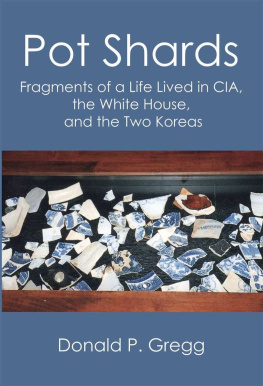Pot Shards
Fragments of a Life Lived in CIA, the White House, and the Two Koreas
Donald P. Gregg
An ADST-DACOR Diplomats and Diplomacy Book

Washington, DC
Copyright 2014 by Donald P. Gregg
New Academia Publishing 2014
All statements of fact, opinion, or analysis expressed are those of the author and do not reflect the official positions or views of the CIA, any other U.S. Government agency, the Association for Diplomatic Studies and Training, or DACOR, Inc. Nothing in the contents should be construed as asserting or implying U.S. Government authentication of information or Agency endorsement of the authors views. This material has been reviewed by the CIA to prevent the disclosure of classified information.
All rights reserved. No part of this book may be reproduced or transmitted in any form or by any means, electronic or mechanical, including photocopying, recording, or by any information storage and retrieval system.
Published in eBook format by New Academia Publishing/Vellum Books
Converted by http://www.eBookIt.com
Library of Congress Control Number: 2014941748
ISBN 978-0-9904471-8-4 ebook
ISBN 978-0-9904471-0-8 paperback (alk. paper)
ISBN 978-0-9904471-1-5 hardcover (alk. paper)
 An imprint of New Academia Publishing
An imprint of New Academia Publishing
 New Academia Publishing
New Academia Publishing
PO Box 27420, Washington, DC 20038-7420
ADST-DACOR DIPLOMATS AND DIPLOMACY SERIES
Series Editor : MARGERY BOICHEL THOMPSON
 Since 1776, extraordinary men and women have represented the United States abroad under widely varying circumstances. What they did and how and why they did it remain little known to their compatriots. In 1995, the Association for Diplomatic Studies and Training (ADST) and DACOR, an organization of foreign affairs professionals, created the Diplomats and Diplomacy book series to increase public knowledge and appreciation of the professionalism of American diplomats and their involvement in world history. Donald Greggs account of his years in CIA, the White House, and the U.S. Embassy in Seoul, the 53rd volume in the series, is a window into Cold War secret operations and diplomacy with a major ally.
Since 1776, extraordinary men and women have represented the United States abroad under widely varying circumstances. What they did and how and why they did it remain little known to their compatriots. In 1995, the Association for Diplomatic Studies and Training (ADST) and DACOR, an organization of foreign affairs professionals, created the Diplomats and Diplomacy book series to increase public knowledge and appreciation of the professionalism of American diplomats and their involvement in world history. Donald Greggs account of his years in CIA, the White House, and the U.S. Embassy in Seoul, the 53rd volume in the series, is a window into Cold War secret operations and diplomacy with a major ally.
RELATED TITLES IN THE SERIES
Jonathan Addleton, Mongolia and the United States: A Diplomatic History
Herman J. Cohen, Intervening in Africa: Superpower Peacemaking in a Troubled Continent
Charles T. Cross, Born a Foreigner: A Memoir of the American Presence in Asia
John H. Holdridge, Crossing the Divide: An Insiders Account of Normalization of U.S.-China Relations
Edmund J. Hull, High-Value Target: Countering al Qaeda in Yemen
Dennis Kux, The United States and Pakistan, 19472000: Disenchanted Allies
Terry McNamara, Escape with Honor: My Last Hours in Vietnam
William B. Milam, Bangladesh and Pakistan: Flirting with Failure in Muslim South Asia
Robert H. Miller, Vietnam and Beyond: A Diplomats Cold War Education
William Michael Morgan, Pacific Gibraltar: U.S.-Japanese Rivalry over the Annexation of Hawaii, 18851898
Ronald Neumann, The Other War: Winning and Losing in Afghanistan
David D. Newsom, Witness to a Changing World
Nicholas Platt, China Boys: How U.S. Relations with the PRC Began and Grew
Howard B. Schaffer, The Limits of Influence: Americas Role in Kashmir
Ulrich Straus, The Anguish of Surrender: Japanese POWs of World War II
Nancy Bernkopf Tucker, Ed., China Confidential: American Diplomats and Sino-American Relations, 19451996
For a complete list of series titles, visit < adst.org/publications >
For Meg
With my love and thanks
For the joys of many years
Preface
His hair was glossy, his handshake firm and dry, his glance hard and inquisitive. The few seconds in which I had his full attention left me with an indelible impression. That was John F. Kennedy at the White House, 1962, talking about counterinsurgency and the Vietnam War.
The CIA officers hair and eyelashes were burned away, his skin was charred, but his eyes were open and his blistered lips moved. This is what Ive been looking for, a cool place, me with my clothes off, and beautiful ladies all around. A white phosphorous grenade had fatally burned the CIA officer. The scene was a U.S. Army hospital, Vietnam, 1971.
I know how things work around here, said Ambassador Philip Habib. They are going to kill him, but they may wait until they hear something from me. If you can tell me who has him and where he is by tomorrow morning, we may be able to keep him alive. The ambassador was describing the kidnapping of Kim Dae-jung. South Korea, August 1973.
Fragments of memory have persisted through the vagaries of time, like shards of pottery broken long ago. They are reminders of things from the all-but-forgotten past. When I was U.S. ambassador to South Korea, I would often stop my armored car at construction sites in Seoul to prowl around freshly broken ground, looking for ancient pot shards newly exposed. I have boxes of shards thus collected that can never be reconnected to what once was whole. I also have a vivid collection of memories that I will try to string together to create the narrative of this book.
I remember waking up one night long ago, a small boy filled with the fear of dying. I cried out and my parents heard me and came into my room. I was still snuffling, but they comforted me enough so that I asked through my tears if I would live to see the year 2000.
They assured me that I would, and I asked how old I would be when that date came. They told me that I would be 72 years old. That seemed so reassuringly far off in the future that I was able to fall back into sleep.
It is now well more than fourteen years into the twenty-first century, and I realize that if I am ever to connect the dots of my memory, I had better get started now.
So I shall begin.
Thanks and Recollections
First of all, I am very grateful to Andrew Szanton, my long-time editor, and to Margery Thompson, ADST publishing director and series editor, who have worked so well as a team, and have done so much to bring Pot Shards into publishable form. I am also grateful to my son John, twenty-five years a journalist, for his professional judgments along the way.
Next I want to mention Tapani Kaskeala, my great friend in Helsinki. I sent him the chapter The Finnish Connection as a gesture of friendship. Thanks to him it was printed in Finlands leading magazine in the fall of 2013. Thank you, Tapani.
Turning to Korea, I want to thank professors Chung-in Moon and John Delury of Yonsei University for using excerpts from Pot Shards in their book Bound by Destiny , dealing with my activities in Korea over the past forty years.
Then along the way, several close friends have read Pot Shards in its various nascent forms, and encouraged me by their comments. In particular I want to thank Lucy Blanton, Jane and Bob Geniesse, Alice Gorman, Jan Harrison, Lorrie Harrison, Carla Hawryluk, Sue and Jack McMahon, and Jane Wood.
In the writing process, as I dug back deep into the past, people re-emerged who meant a great deal to me at the time I knew them. I believe that their collective impact was one of the major factors that led me to write this book.
Next page






 An imprint of New Academia Publishing
An imprint of New Academia Publishing New Academia Publishing
New Academia Publishing Since 1776, extraordinary men and women have represented the United States abroad under widely varying circumstances. What they did and how and why they did it remain little known to their compatriots. In 1995, the Association for Diplomatic Studies and Training (ADST) and DACOR, an organization of foreign affairs professionals, created the Diplomats and Diplomacy book series to increase public knowledge and appreciation of the professionalism of American diplomats and their involvement in world history. Donald Greggs account of his years in CIA, the White House, and the U.S. Embassy in Seoul, the 53rd volume in the series, is a window into Cold War secret operations and diplomacy with a major ally.
Since 1776, extraordinary men and women have represented the United States abroad under widely varying circumstances. What they did and how and why they did it remain little known to their compatriots. In 1995, the Association for Diplomatic Studies and Training (ADST) and DACOR, an organization of foreign affairs professionals, created the Diplomats and Diplomacy book series to increase public knowledge and appreciation of the professionalism of American diplomats and their involvement in world history. Donald Greggs account of his years in CIA, the White House, and the U.S. Embassy in Seoul, the 53rd volume in the series, is a window into Cold War secret operations and diplomacy with a major ally.